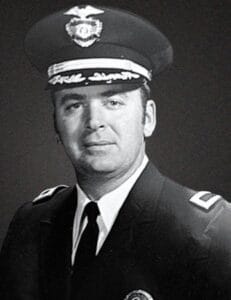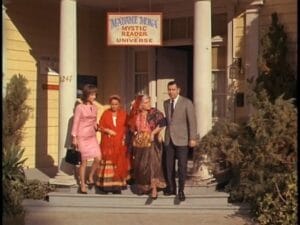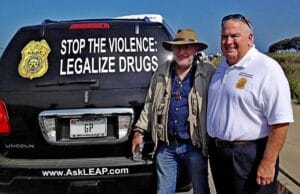
Born in Hanford, a small agricultural community in California’s Central Valley, there’s very little known about Downing’s upbringing, just that he joined the Los Angeles Police Dept. as a police officer in around 1960. He was clearly intelligent, not only rising in the ranks quickly, but also continuing in school, at the California State University, Los Angeles, studying the obvious — Public Administration — and the not-so-obvious: creative writing. On the job, he was assigned to South-Central, one of L.A.’s toughest areas, working patrol, criminal investigation, narcotics, vice, and organized crime intelligence. He rose to be captain of detectives, where he established homicide investigation techniques still in use today; Commanding Officer of the Juvenile Division, where he brought an end to abuses in state probation subsidy programs; and Commanding Officer of Southwest Area, where he designed and implemented the first functionally integrated police operation in law enforcement aimed at combating gang activity — a program that became a national model. He retired in 1980 as Deputy Chief.
Along the way, he had a side job, working weekends writing. Jack Webb bought his first script, for an episode of Dragnet (“The Big Clan”, 1968, exposing “Gypsy” fortune tellers scamming people). Downing went on to write 10 more episodes for the series. But to stay under the radar of his commanders, he wrote under pseudonyms. He was “Michael Donovan” for Dragnet and nine other shows, including Adam-12, Emergency!, and Police Story. He used “Sean Baine” for 16 shows, including Kojak, Quincy, M.E., Get Christie Love!, S.W.A.T., The Rookies, and The Streets of San Francisco. And he used “Adrian Leeds” for five shows, including Baretta and Police Woman. Rather than risk being seen at production offices, his wife, Adrienne, would deliver his scripts.

Once Downing retired from LAPD, he was well poised to branch into working as an executive producer and showrunner, finally under his own name, working on T.J. Hooker, Knight Rider, F/X: The Series, RoboCop, and more. He was especially influential in the design of the lead character of MacGyver (1985), when he was brought in as the showrunner after the pilot episode. It was Downing who decided MacGyver wouldn’t carry a gun, but would rather use science-based cunning to get his way out of bad situations. He stayed with the series until it ended in 1992.
He wrote from his own experiences, including an undercover drug sting that went bad. “When I was commander, we … had an undercover buy [in 1973] and the crooks were really more interested in a rip-off, so when the officer flashed the money, rather than the crook coming up with the dope, [the dealer] brought out a gun and basically executed the officer and took the money. We had people in rooms on all sides. Of course the guy was caught and he was prosecuted for murder, but the jury found him not guilty.” Wait… what?! “The crooks defended themselves by thinking they were dealing with another crook who was armed. So they put up a self-defense [strategy] and basically what’s in the mind of the jurors is that these are two thugs looking at each other. Nobody knew they were killing a policeman. Even though what they were doing was against the law, as far as first-degree murder, the jury didn’t buy it.” Of course, “There was outrage. The judge was outraged, the DEA was outraged, the police were outraged, I was outraged. And so now I’m looking at a young police officer that had a few years on the job and we put him on narcotics and then we made him an undercover cop, and all that’s very sexy for a guy, but he had two kids and a wife.”
He realized the war wasn’t worth it. “What in the world are we accomplishing by using law enforcement resources this way and seeing our young people killed for some goddamn dope? A kilo of dope when it’s coming into this country by the warehouse full. Pardon my expression, but we’re shoveling shit against the tide.” The “War on Drugs”, started by President Richard Nixon on June 17, 1971, declared drugs “Public Enemy Number One.” In a 2015 interview, Downing said “We’ve spent over a trillion dollars in the last 40 years enforcing this insane thing, and we’ve incarcerated more Americans than any civilized country of the world. We are 5% of the world’s population and we have 25% of the world’s prisoners. That doesn’t say much for a country that’s based on individual freedom, now does it?” And it has gotten worse in the 10 years since.

But what about drug cartels? Don’t we need to fight them? “U.S. law enforcement officials report that as much as 70% of cartel profits come from marijuana alone,” Downing wrote in a 2011 op-ed in the Los Angeles Times. “There’s no question that ending today’s prohibition on drugs — starting with marijuana — would do more to hurt the cartels than any level of law enforcement skill or dedication ever can.” He didn’t advocate a free-for-all: he wanted drugs regulated to make sure they weren’t cut with even more dangerous substances. Not “forbidden fruit,” and not so expensive. If the only way to get them is to commit crimes to get the cash, violent crime is the obvious result. Cartels profit from the current war by keeping drug prices high. The “war” plays into their hands.
“Worse than being ineffective, though, the war on drugs creates dangerous distractions for police officers who would rather focus on improving public safety. For example, the LAPD announced this week [in 2015] that it will take 150 police officers off the streets to accommodate the state’s shuffling of prisoners to the county level. The state must do this to comply with the U.S. Supreme Court’s order to cut our drug-war-induced overcrowded prison population by 30,000 — and our state has already laid off thousands of teachers thanks in part to funding diverted to building more prisons and hiring more guards. This follows on the heels of another reallocation of police resources in Los Angeles when the LAPD and the L.A. Sheriff’s Department woke up to a three-year backlog of rape kits. Police labs have only a finite amount of resources, and drug testing often takes priority over other cases that demand attention. Detectives (and victims) waiting for lab results related to rape and other serious crimes stood in line for months while tests for custody-related possession of pot and other drugs took precedence.
“There’s no doubt that the violence, the growth of cartels and gangs, the overpopulation of our prisons and the squandering of our police resources would not occur if we eliminated illegal drug profits and implemented a non-criminal approach to regulating drugs. We did this once with alcohol, and there’s no reason we can’t do it with other drugs today.” Downing also argued against the militarization of police, another “problem that has been metastasizing within American law enforcement since the early 1970s” as part of the war on drugs, Downing wrote in 2020. That really “took root in the 1980s as a result of President Reagan’s escalation that poured millions into the drug war, shifting the focus of local law enforcement away from violent and property crimes to mostly small-time drug offenders.” Though it was actually billions, not millions.
Worse, forfeiture laws — allowing police to confiscate money that “may” have been the proceeds of a crime — make policing a profit-making enterprise. “What that means is that the chief has to take resources that should be devoted to community policing, property crimes, crimes against persons, and devote them to asset seizures. As we know, in over 80% of the cases with asset seizures, a criminal filing is never made, so they’re just out after the money. It’s a very, very corrupting process.” Downing dedicated the rest of his professional career speaking out and writing against the War on Drugs, the militarization of police, asset seizures, and writing policy for “LEAP” — Law Enforcement Against Prohibition, which later renamed itself Law Enforcement Action Partnership. Downing died on November 20, at 87.
